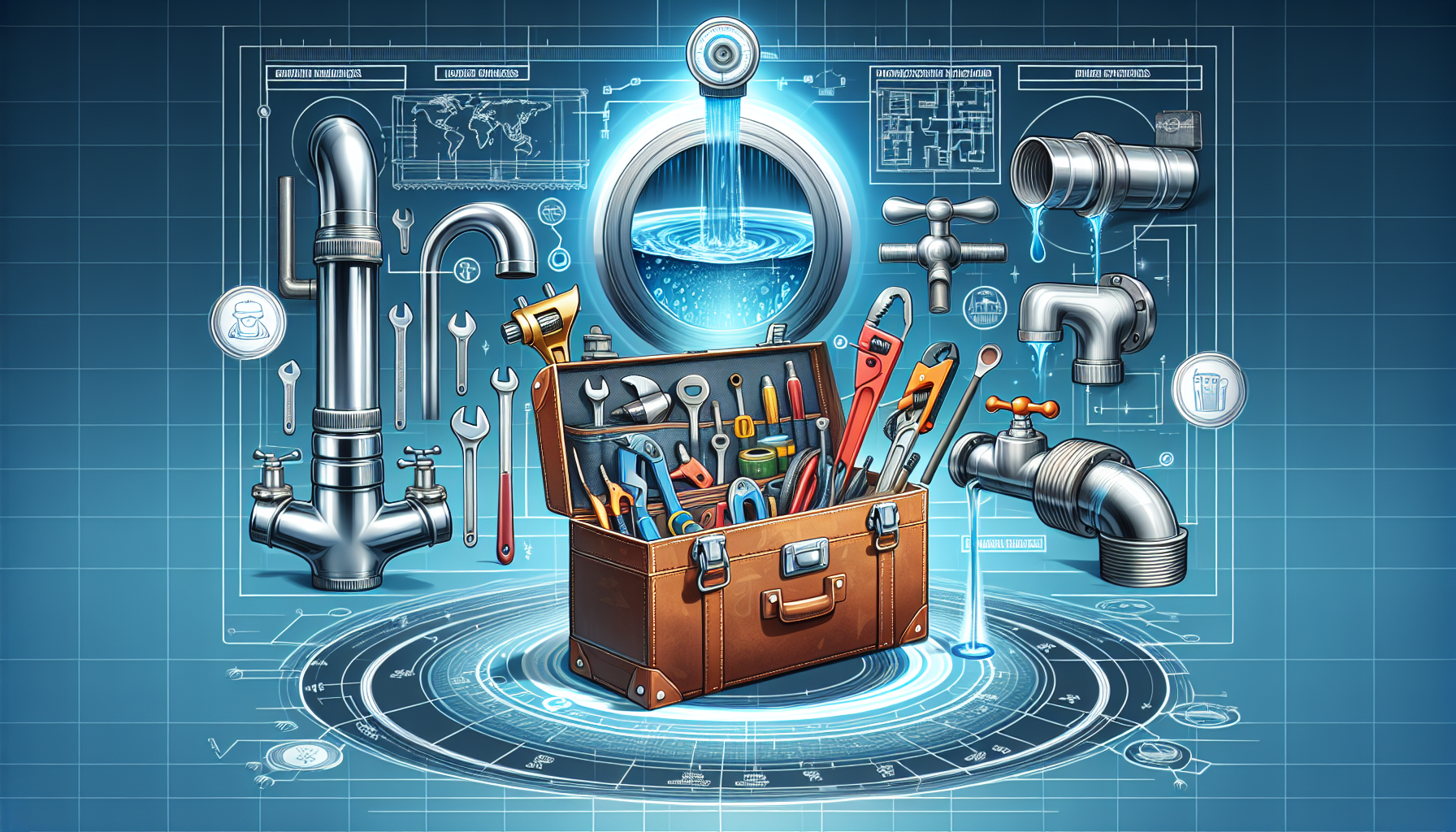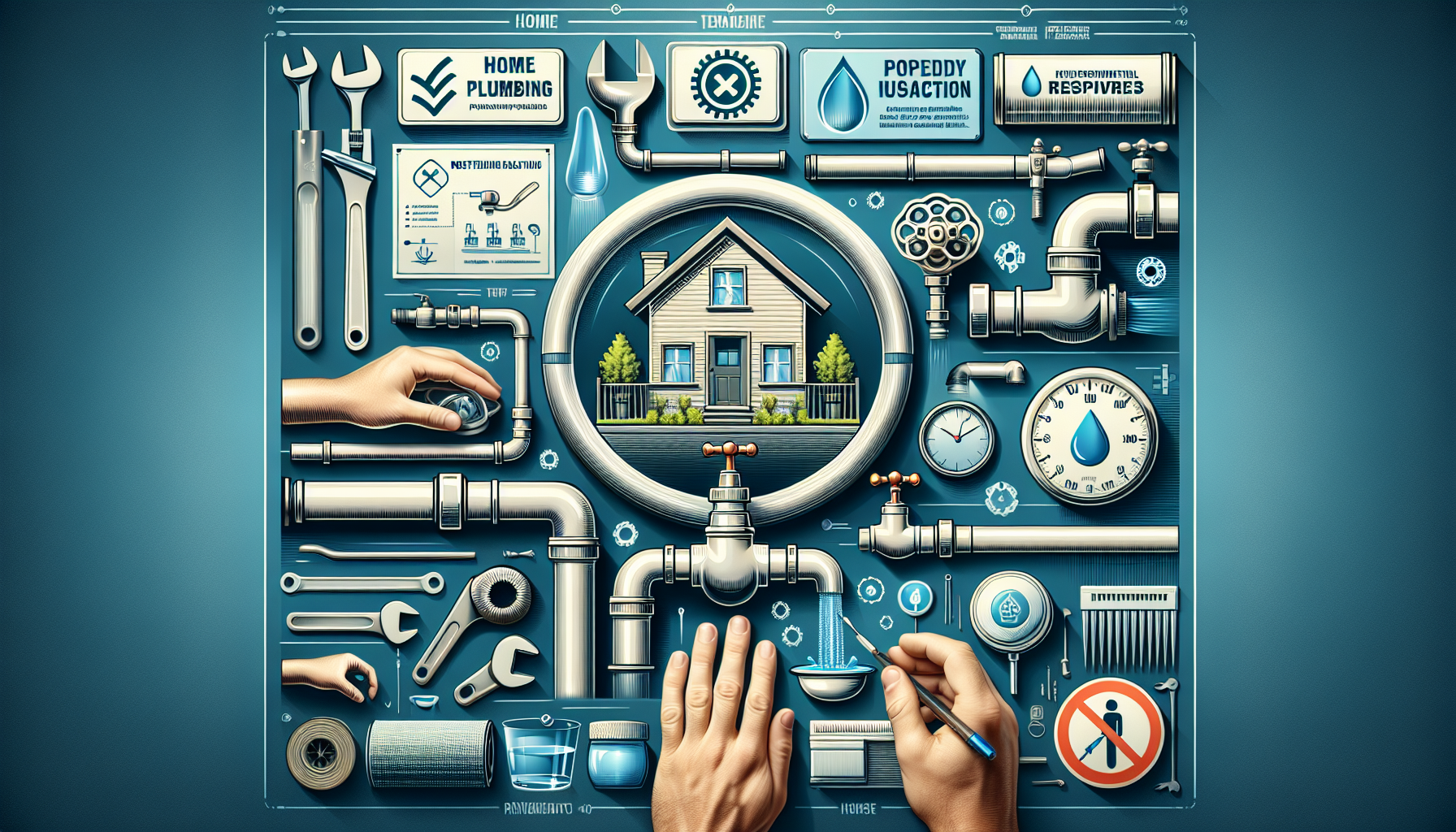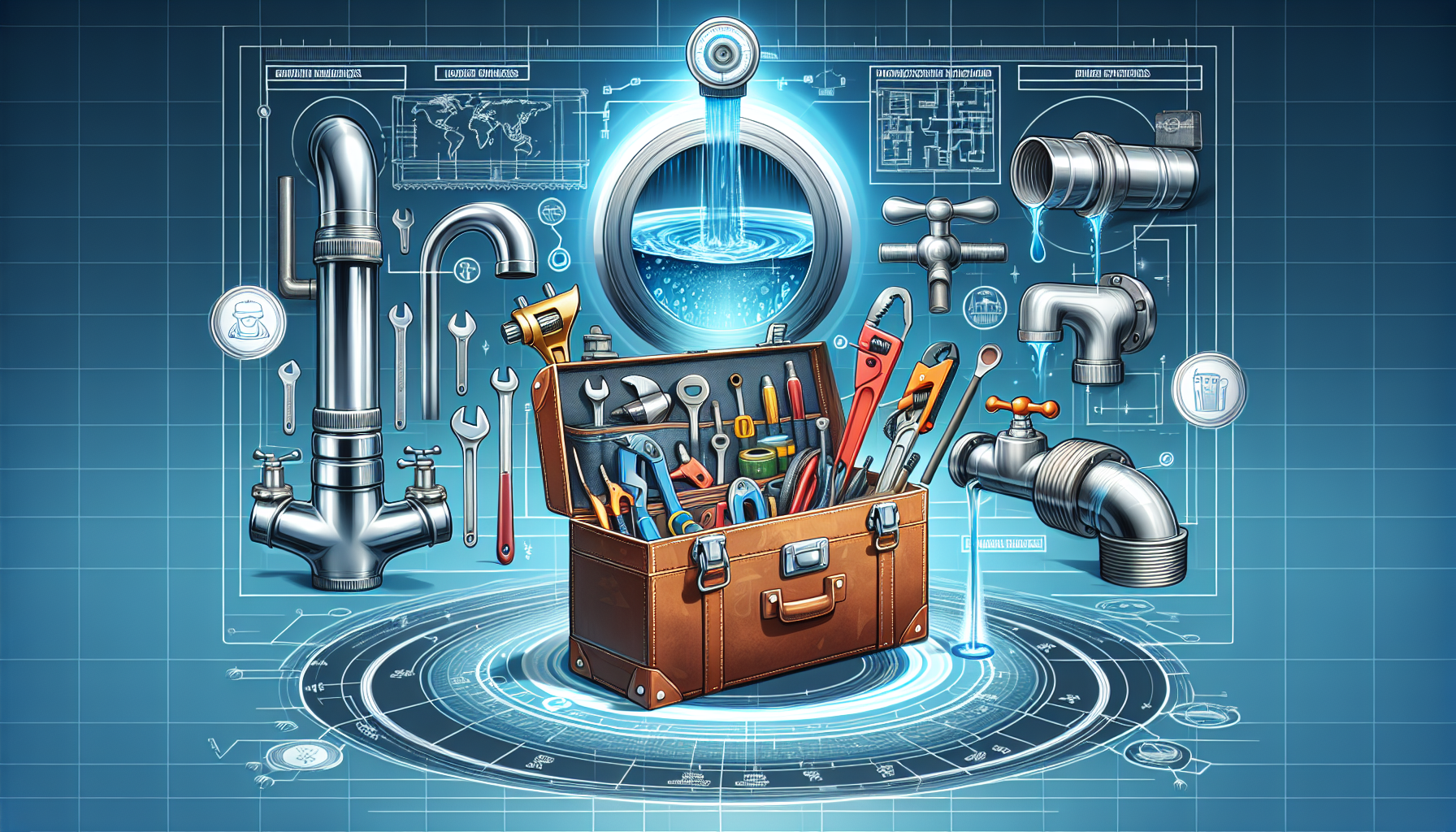In this article, you will discover some practical tips and tricks to help you prevent common plumbing problems in your home. From leaky faucets and clogged drains to burst pipes and water damage, these preventative measures will not only save you time and money but also ensure the smooth running of your plumbing system. So, whether you are a homeowner or a tenant, read on to find out how you can avoid the headache of dealing with common plumbing issues.
Preventative Measures for Common Plumbing Problems
Plumbing problems can be a major hassle to deal with, causing inconvenience and expensive repairs. Thankfully, many common plumbing issues can be prevented by taking some proactive measures and performing regular maintenance. By inspecting and maintaining your plumbing fixtures, preventing clogs in drains and pipes, addressing leaky faucets and pipes, preventing burst pipes, maintaining water pressure, protecting against sewer backup, preventing water heater issues, avoiding frozen pipes, maintaining a healthy septic system, and preventing plumbing fixture damage, you can keep your plumbing system in top condition. In this article, we will discuss each of these preventive measures in detail to help you ensure the smooth functioning of your plumbing system.

Inspecting and Maintaining Plumbing Fixtures
Regularly inspecting and maintaining your plumbing fixtures is essential for preventing plumbing problems. Start by checking for any signs of leaks or drips in faucets, showerheads, and toilets. A dripping tap can waste a significant amount of water over time and also lead to higher water bills. Inspect the pipes under the sinks for any leaks or signs of corrosion. It’s also crucial to check the water supply hoses connected to appliances like washing machines, dishwashers, and ice makers for signs of wear and tear. Replace any damaged hoses immediately to prevent leaks and potential water damage.
Aside from checking for leaks, it’s important to clean and maintain your fixtures regularly. Sediment and mineral buildup can affect the performance of faucets and showerheads, leading to reduced water flow. Regularly remove and clean the aerators in your faucets and showerheads to ensure a steady flow of water. Additionally, check the rubber gaskets and O-rings in your fixtures for any signs of deterioration or damage. Replace these parts as necessary to prevent leaks and ensure proper functioning.
Preventing Clogs in Drains and Pipes
Clogged drains and pipes are one of the most common plumbing problems homeowners face. The best way to prevent clogs is to be mindful of what goes down your drains. Avoid pouring grease, oil, or coffee grounds down the kitchen sink, as they can solidify and cause blockages. Use drain strainers or stoppers in your sinks and tubs to catch hair, food particles, and other debris that can accumulate and cause clogs. Regularly clean these strainers to maintain their effectiveness.
In the bathroom, avoid flushing anything other than toilet paper down the toilet. Wet wipes, feminine hygiene products, and dental floss can clog the pipes and cause backups. Make sure everyone in your household knows what can and cannot be flushed. Also, consider using enzyme-based drain cleaners on a regular basis to keep your drains clear. These cleaners help break down organic matter and prevent clogs from forming.
Addressing Leaky Faucets and Pipes
Leaky faucets and pipes not only waste water but can also cause damage to your home. A small drip can quickly turn into a steady leak, leading to mold growth and water damage. If you notice a leaky faucet or pipe, it’s important to address the issue as soon as possible. Start by tightening any loose fittings or connections with a wrench. If the leak persists, replace the worn-out washers, o-rings, or other faulty parts.
For more significant leaks or burst pipes, it’s best to call a professional plumber right away. They have the expertise and tools to fix the problem safely and effectively. Remember, addressing leaks promptly can save you money on your water bill and prevent costly repairs down the line.
Preventing Burst Pipes
Burst pipes can cause significant damage to your home and belongings. The best way to prevent them is by taking proactive measures to protect your pipes, especially during the cold winter months. Insulate any exposed pipes in areas like basements, attics, and crawl spaces with foam pipe insulation. This insulation helps to keep the pipes warm and prevent them from freezing.
During freezing temperatures, it’s also essential to leave cabinet doors open under sinks to allow warm air to circulate around the pipes. Keep your thermostat set at a constant temperature, even when you’re away from home. Letting faucets drip slightly can help relieve pressure in the pipes and prevent them from bursting.
If you’re planning to be away from home for an extended period during winter, it’s crucial to take extra precautions. Consider shutting off the main water supply and draining the pipes to prevent any potential freezing and bursting. If you’re unsure how to do this, consult a professional plumber for assistance.

Maintaining Water Pressure
Proper water pressure is essential for the efficient functioning of your plumbing fixtures. Low water pressure can be frustrating, while high water pressure can cause stress on your pipes and fixtures. To maintain optimal water pressure, regularly check and clean the aerators in your faucets and showerheads. Sediment and mineral buildup can restrict the flow of water, leading to reduced water pressure. Clean or replace the aerators as necessary to ensure a steady flow.
If you notice a sudden drop in water pressure throughout your home, it could be a sign of a more significant plumbing issue. In this case, it’s best to consult a professional plumber to identify and address the underlying problem.
Protecting Against Sewer Backup
Sewer backup is a messy and unpleasant plumbing problem that can cause extensive damage to your home and health hazards. To prevent sewer backup, avoid flushing anything other than toilet paper down the toilet. Additionally, avoid pouring grease, oil, or harsh chemicals down your drains. These substances can solidify in the pipes and cause blockages.
Installing backwater valves is another effective measure to protect against sewer backup. Backwater valves allow sewage to flow out of your home but automatically close to prevent any backflow. Regularly inspect and maintain these valves to ensure they’re functioning properly. In areas prone to heavy rainfall or flooding, consider installing a sump pump to remove excess water from your basement or crawl space and prevent sewer backup.
Preventing Water Heater Issues
A well-maintained water heater is essential for a consistent supply of hot water and energy efficiency. To prevent water heater issues, it’s crucial to perform regular maintenance. Start by draining and flushing the tank at least once a year to remove any sediment buildup. Sediment can affect the heating performance and lifespan of your water heater.
Inspect the temperature and pressure relief valve on your water heater regularly to ensure it’s functioning correctly. This valve helps to prevent your water heater from overheating or building up excess pressure. If you notice any leaks or signs of damage, have the valve replaced immediately.
Additionally, check the anode rod in your water heater every three to five years. This sacrificial rod helps to prevent the tank from corroding. If the rod is heavily corroded, it’s important to replace it to protect your water heater from premature failure.
Avoiding Frozen Pipes
Frozen pipes can cause significant damage and costly repairs. To avoid frozen pipes, insulate any exposed pipes in areas prone to freezing, such as basements, attics, and crawl spaces. Use foam pipe insulation or heat tape to protect the pipes from the cold. Seal any cracks or gaps in your home’s exterior to prevent cold air from reaching the pipes.
During freezing temperatures, let faucets drip slightly to relieve pressure in the pipes and prevent them from freezing. Keep your thermostat set at a constant temperature, even when you’re away from home. If you’re going to be away for an extended period during winter, consider shutting off the main water supply and draining the pipes to prevent freezing and potential bursting.
Maintaining a Healthy Septic System
If you have a septic system, proper maintenance is crucial to prevent costly repairs and ensure its longevity. Regularly inspecting and pumping your septic tank is essential for its proper functioning. Depending on the size of your household, it’s recommended to have the tank pumped every three to five years.
Be mindful of what goes down your drains to prevent the buildup of solids in the septic tank. Avoid flushing anything other than toilet paper and human waste down the toilet. Additionally, avoid pouring grease, oil, or harsh chemicals down the drains, as they can disrupt the bacterial balance in the tank.
Regularly inspect the drain field for any signs of standing water or sewage odor. These can be indicators of a failing septic system. In such cases, it’s important to consult a septic professional to assess the issue and perform any necessary repairs.
Preventing Plumbing Fixture Damage
Accidental damage to plumbing fixtures can happen, but there are some preventive measures you can take to minimize the risk. Avoid using excessive force when operating faucets and valves to prevent damaging the internal components. Teach children not to hang or pull on faucets or handles, as this can cause leaks or breakage.
It’s also important to be mindful of the water pressure coming out of your fixtures. Excessively high water pressure can strain the fixtures and shorten their lifespan. Consider installing a pressure regulator or having one installed if your water pressure is too high.
Regularly inspect the seals and gaskets around your fixtures for any signs of wear or deterioration. Replace these parts as necessary to prevent leaks and maintain the optimal functioning of your fixtures. It’s also important to use gentle cleaning products and methods to avoid damaging the finishes on your fixtures.
In conclusion, by following these preventive measures and performing regular maintenance, you can significantly reduce the risk of common plumbing problems. Inspecting and maintaining your plumbing fixtures, preventing clogs in drains and pipes, addressing leaky faucets and pipes, preventing burst pipes, maintaining water pressure, protecting against sewer backup, preventing water heater issues, avoiding frozen pipes, maintaining a healthy septic system, and preventing plumbing fixture damage are all crucial steps to ensure the proper functioning and longevity of your plumbing system. Remember, prevention is key, and investing a little time and effort now can save you from costly repairs and inconvenience in the future.

